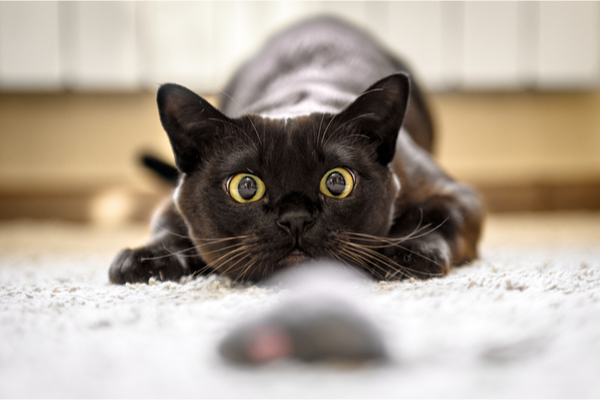Our feline friends try to be aloof, but they know exactly how to get our attention. And some cats decide they want that attention in the middle of the night, right when you’re trying to get in that critical REM sleep.
As Daily Paws reports, a cat meowing at night is eager to awaken you for something specific. It could be as simple as they are hungry, or maybe they are bored and want to play. It could also be a sign of stress or fear due to a change in environment, or something more serious. We spoke to an expert to break down the kitty communication code and get advice on how to handle these nightly interruptions.
Why Do Cats Meow at Night?
Cats have specific body language, and if you watch (and listen!) closely, you’ll learn a lot about their moods, emotions, and desires.
For example, spraying or marking is often a tip-off that your cat feels stressed or threatened, especially by other cats or a change in their environment. A tail wrap around your leg means kitty is affectionate and trusting (various tail wags tell you a lot!) Even when they just follow you around, they’re shouting out about something, such as they don’t feel well—or think what you’re doing is entertaining.
So why is your cat meowing at night? Leslie Sinn, DVM, DACVB, CPDT-KA, is a specialist in animal behavior, owner of Behavior Solutions, and a member of the Daily Paws Advisory Board. She says, quite simply, they need you. “Cats meow for a variety of reasons but they’re basically seeking attention, food, or play from their owners,” she said in an interview with Daily Paws. “They also do it if they’re distressed, confused, or otherwise worried.”
Think of how some people talk nervously when they’re upset about something. Kitties can do this too, and they really hope you catch on. Common feline stressors include relocation, illness, and behavioral changes as they age. “If this is new behavior for your cat, especially an older cat, please take your kitty to your veterinarian to rule out any underlying medical issues, especially painful conditions, thyroid disease, and, in older cats, cognitive decline,” Sinn says.
Expanding your family with a kitten, dog, or baby might also confound your cat, making them more prone to meowing at night and even emitting yowls and other different cat noises as they try to figure out what’s going on.
Sinn says there’s also the possibility that if your cat hasn’t been spayed or neutered, they will call or yowl while seeking a mate and/or warn competitors away. If you suspect this is the case, arrange for a vet consultation to discuss next steps.
How to Stop Your Cat from Meowing All Night
It’s important to determine the specific cause as to why your cat is crying at night. However, there’s a fine line between adjusting the behavior with positive reinforcement … and making it worse.
“For example, if the reason is attention seeking, then responding to the cat’s meows will only make it more likely that the cat will disturb you at night,” Sinn says. It’s not that cats are manipulative, but they do respond to our training cues. If we leave our warm, cozy bed every time we hear our cat meowing at night, they’ll think they’re our benevolent overlords.
So perk up your cat antenna the next time your cat won’t stop meowing at night, and tune in to their signals:
- Hungry: Does kitty run to the food or treat cabinet as soon as they see you? “Use a timed feeder for a midnight snack if the cat is disturbing you because it wants food,” Sinn says. “Or provide a food puzzle that will last through the night.”
- Feeling playful: When you switch on the light, do they get the zoomies or flip-flop about? It’s playtime! “Arrange for a 15-minute play session an hour or so before bedtime,” Sinn says. Some ideas might be to run a feather up and down their cat tree, throw a wadded ball of paper across the floor, or use an interactive toy for fun bonding.
- Wants company: If your fuzzball simply blinks at you or seeks immediate lap space, they might be bored and want company. “Give your cat attention when it’s quiet during the day, and reward quiet behavior,” Sinn says. “And make sure their environment is appropriately enriched.” This might include better exercise options and stimulating games.
Sinn adds that as a general rule, a second pet is never recommended to help solve the issue of your cat meowing at night. “However, if it’s a young, active cat and the owner just can’t meet their exercise and interaction needs, a compatible playmate may be an option.”
—
Photo Credit: Viacheslav Lopatin / Shutterstock.com
